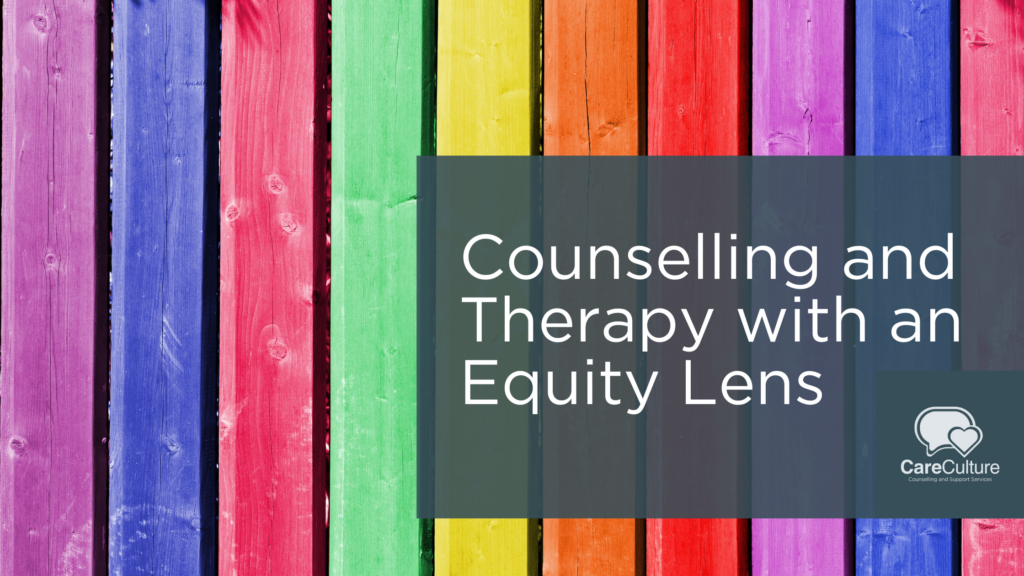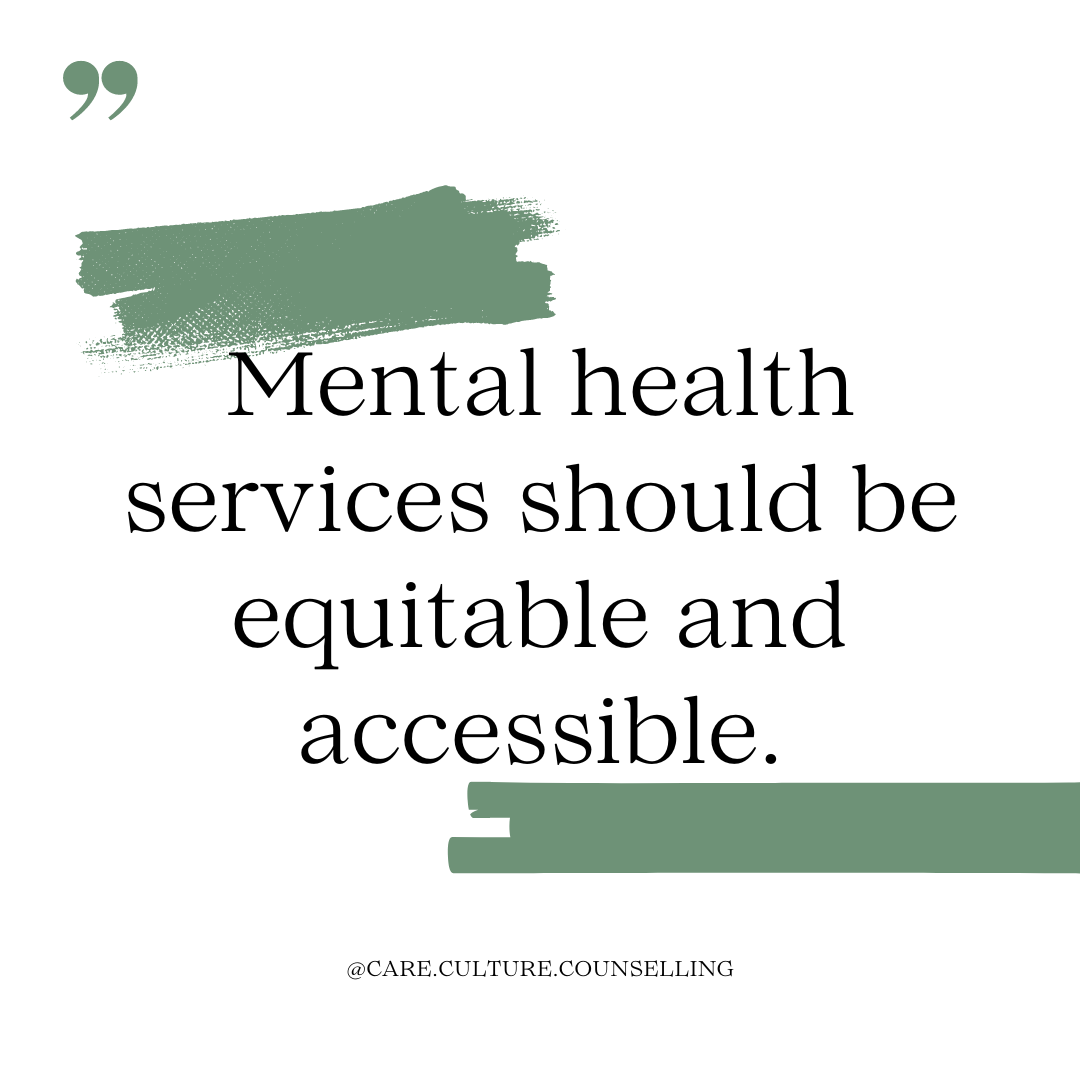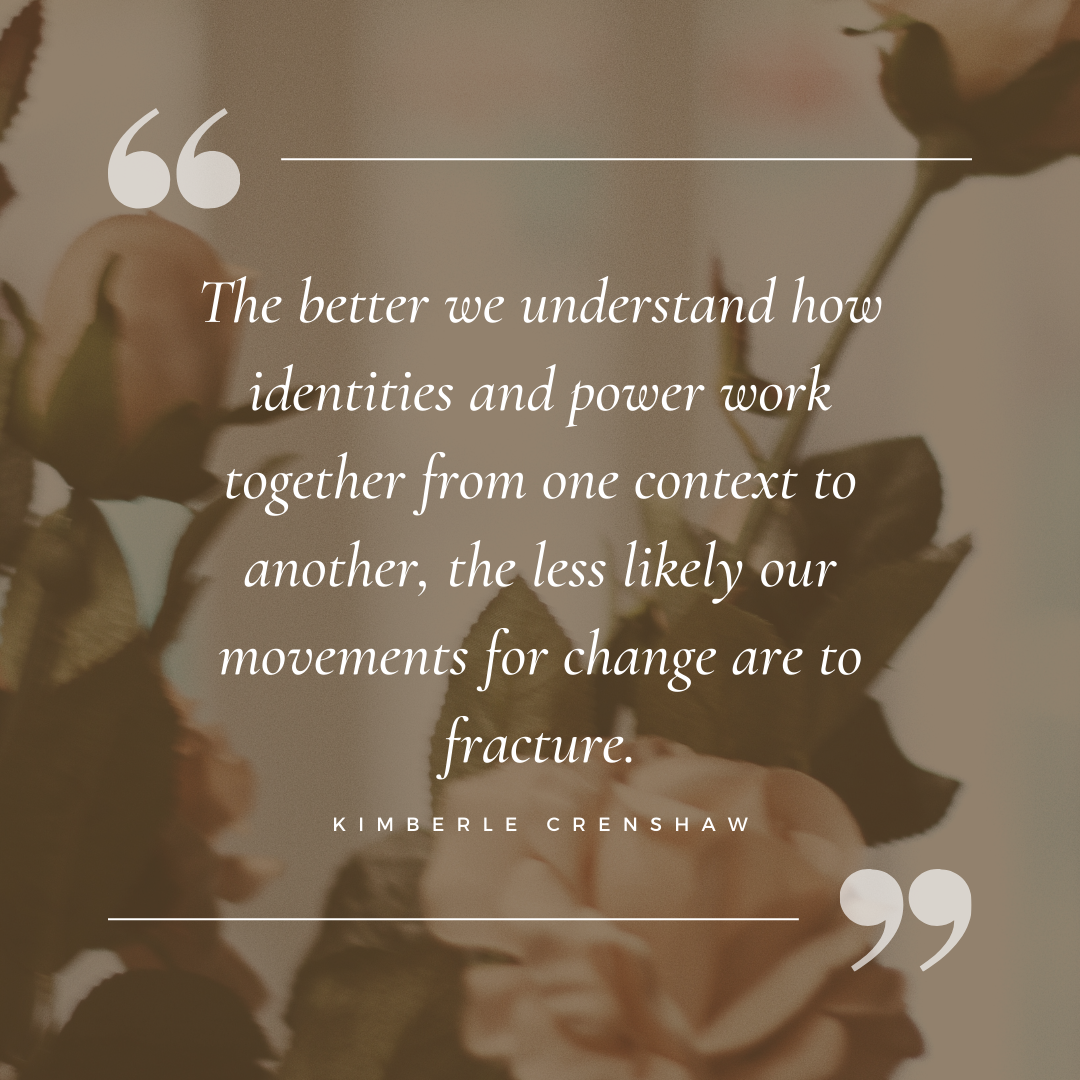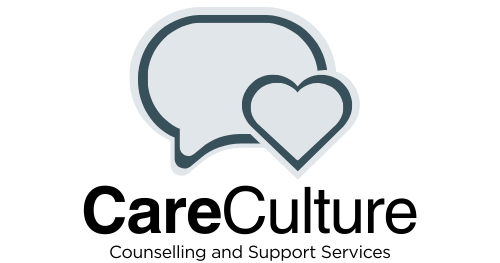
As a Registered Social Service Worker with the Ontario College of Social Work and Social Service Workers, I provide counselling and psychotherapy services to folks all across Ontario, Canada. One of the core tenants of my work is to ensure that I am providing services through an equitable lens. While all therapists and counsellors aim to provide fair and balanced services, therapy with an equitable lens goes beyond the typical mental health and professional theoretical education and brings an equity lens to an overall approach and practice.
Equity vs Equality

The words sound kind of the same right? As a society, we saw the fight for equality for decades. Equal rights for everyone, which makes a lot of sense. However, over the past few years we have seen a rise in the term equity.
According to the Cambridge Dictionary, Equity means:
“the situation in which everyone is treated fairly according to their needs and no group of people is given special treatment”
Now when we look at that, the term “special treatment” can be interpreted many ways. When I see that term, I understand it as meaning that no group of people will be given special treatment if they are not in need of accommodation to meet a need(s).
Equality means that everyone is treated the same, regardless of need, regardless of struggle, regardless of the situation. Equity takes the whole person and situation into consideration and provides treatment based on the need of the person and situation, with a goal of leveling the playing field.
Equity Lens in Counseling and Therapy
Equity in counseling refers to the principle of fairness and impartiality, ensuring that all individuals have equal access to mental health services and receive treatment that is tailored to their unique needs. It involves recognizing and addressing systemic barriers that may prevent certain groups, such as marginalized communities or those with limited financial resources, from accessing counseling support. Equity in counseling also encompasses cultural sensitivity, acknowledging diverse backgrounds, experiences, and identities, and providing culturally competent care that respects and validates clients’ perspectives. By prioritizing equity, counselors strive to create an inclusive and supportive environment where all clients feel valued, understood, and empowered to achieve their mental health goals.
Accessible Therapy and Counselling
Disability accessibility and equity are intricately linked within a counseling practice, as they both aim to ensure that individuals with disabilities have equal opportunities to access and benefit from mental health services. Accessibility involves removing physical, architectural, communication, and attitudinal barriers that may hinder individuals with disabilities from fully participating in counseling sessions. This may include providing wheelchair ramps, accessible facilities, alternative formats for materials, and accommodations for sensory or cognitive differences. Equity, on the other hand, focuses on addressing systemic inequalities and biases that may disadvantage individuals with disabilities, ensuring that they receive equitable treatment and opportunities for growth and healing. By prioritizing both accessibility and equity, counseling practices can create an inclusive environment where individuals of all abilities feel welcomed, supported, and empowered to address their mental health needs.

Equitable Sliding Scale for Financial Need : Affordable Low Cost Counselling and Therapy
I provide a sliding scale in my counseling practice, as it facilitates equitable access to mental health services by adjusting fees based on individual financial circumstances. I recognize that our current mental health, counselling, therapy, and support systems are not affordable to everyone. This creates a barrier to folxs that truly need support, as they are often left with having to decide between meeting basic necessities or seeking much needed supports. Reducing fees based on need ensures that people can receive the essential counselling and therapy supports without facing undue financial strain. A sliding scale provides affordable counselling and mental health support, prioritizing accessibility, inclusivity, and allows folxs from different socioeconomic backgrounds to access support. Prioritizing accessibility through financial means provides an equitable service that recognizes the systemic barriers and aims to foster healthier communities.
Intersectionality and Therapy and Counselling

When you come in looking for help with depression, anxiety, relationships, self esteem, or any other mental health need, you bring your full human experience. It is rare that a person is able to fully compartmentalize a part of their identity when they are seeking support. In counselling and therapy, it is crucial to gain an understanding of the complex factors of race, ethnicity, sexual orientation, gender identity, ability, socioeconomic status, and more when providing support. Who you are and your experiences have an impact on how you experience the world. We can’t ask people to “fix themselves” and ignore the societal impacts on our experiences, opportunities, privileges, and barriers.
Recognizing intersectionality and addressing it through an equity lens within therapy and counseling is paramount for creating an inclusive and effective therapeutic environment. Intersectionality, a concept developed by Kimberlé Crenshaw, acknowledges that individuals hold multiple intersecting identities, such as race, gender, sexuality, socioeconomic status, ability, and more, which shape their experiences and perspectives. Failure to recognize these intersecting identities can lead to oversimplified understandings of clients’ experiences and perpetuate systemic inequalities within therapeutic and counselling practices. Acknowledging intersectionality, therapists can better understand the complex dynamics that influence their clients’ lives and tailor interventions that acknowledge and honor their multifaceted identities.
Adopting an equity lens in therapy requires actively challenging the systemic injustices that contribute to clients’ distress. This involves acknowledging the ways in which structural oppression, such as racism, sexism, homophobia, transphobia, ableism, and classism, impact clients’ mental health and well-being. For instance, individuals from marginalized communities may experience higher rates of trauma, discrimination, and access barriers to mental health care services due to systemic inequalities. That is why I strive to create a therapeutic space that not only validates clients’ experiences of oppression but also empowers them to navigate and resist these systemic forces.
Furthermore, addressing intersectionality within therapy necessitates a commitment to cultural humility and ongoing self-reflection. I am committed to continually examining my own biases, assumptions, and privileges to ensure that they are not inadvertently perpetuating harm or retraumatizing clients. This requires engaging in ongoing education, seeking feedback from clients, and remaining open to challenging conversations about power and privilege. By cultivating cultural humility, I hope to foster a therapeutic relationship built on trust, respect, and collaboration, where clients feel affirmed and understood in all aspects of their identity.
Conclusion
Equity within the counselling and therapy setting is a core part of my practice. I am unable to view the world without seeing how systems, power, privilege, and oppression impact folxs on a daily basis. I also hold space for those who work within settings where they are dismantling and challenging oppressive systems, recognizing that there are times where they need peace and reprieve from the ongoing fight for justice. Holding space and addressing other aspects of their lives is needed for self preservation and care.
